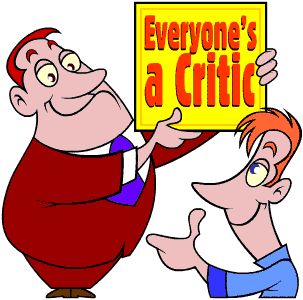
So you write a book and you edit it to within an inch of its life. You get so sick of looking at it and thinking about it you want to toss it in the trash, but something holds you back. No - better keep it on the hard drive, just in case. A few months later you stumble across it and start reading. Wow! Not bad! Maybe I should get a second opinion on this.
So you join a critique group. Lots of clever writers to tell you what's wrong and how to fix it. Just the ticket.
So you post your chapters and await their responses with baited breath. Some may be complimentary, which gives you a boost. Some may miss the point entirely which makes you feel frustrated and upset. Occasionally someone is perceptive enough to see what you're trying to do and offers some solid gold advice on how to improve your work. But that's rare. The fact is, the crit shoot is a long shot at best.
I think the problem with crit groups is:
They are populated with a wide range of people - wide ranging in taste as well as ability.
They exist to find fault with a piece so people don't read something to appreciate its merits, ie the way a reader would read. If you study the first chapter of any novel you will find faults of some sort. It's inevitable. A reader reads to be transported but that won't happen in 'edit' mode.
Unless you beta read the whole thing, there is no way of gauging the whole story. Early chapters can only tell a very limited amount about the writer's ability.
Critters can become full of their own importance, in the way a lot of critics think their critique is more important than the art they are describing. Opinions can become entrenched, rules written in stone. Show don't Tell is one of the favourites, despite the fact many novels are chock full of tell. And bad advice from inappropriately applied 'rules' undermines a writer's confidence.
So, when dabbling in crit groups have a care and always remember a crit is one person's opinion and nothing more.
6 comments:
Hi
While I agree with everything you've said, I think it's also important to remember there aren't many other options available to most writers.
Either you can go through the rather painful process you describe and maybe get some useful advice. Or you can choose not to, and definitely get no useful advice.
So it's best to grit your teeth and hope you don't come away empty-handed. And sometimes you will, it will be of no help whatsoever. But that's just the way it goes.
mood
Moody Writing
@mooderino
That sounds like you speak from some not very good experiences!
But you are right, it does require some strength of character, and self-honesty, to get the best out of critiques and to avoid the worst.
The first crit I ever recieved, read 'Sorry, I can't read this, its unreadable'.
One day the world will thank me for not taking such damning criticism to heart, or they might not...
I've got a lot out of critique groups. You soon learn who the best critiquers are to help you the way you need. But yes, beta readers are also important.
@mooderino Yes, I agree. It's all part of the learning process.
@il_cag It's been a mixed bag of experiences really. I do think critting is more use for the critter than the crittee to be honest. Viewing someone else's work teaches you to look critically at your own. Unreadable? Really? You must let me see it. :-)
@Kate I suppose everyone's experience is different. I've got a lot of good out of them too I suppose. For one thing it's good to have another pair of eyes on your work, whatever they think.
I agree. It's the hardest thing for a writer to get independent, honest feedback. You can pay for it of course, but you also need to test the market place and get an answer to the question, 'Quite simply, did you enjoy it and would you recommend it to your friends?'
Product manufacturers can create small test markets. It's very hard for writers to do that, and you are right to say that having sections of your work dissected outside context is not necessarily helpful.
I find the best way to get honest, independant feedback is to be the critter, critting the work of your writing peers. Then take those lessons learned and apply them to your own work.
- Naomi
Post a Comment